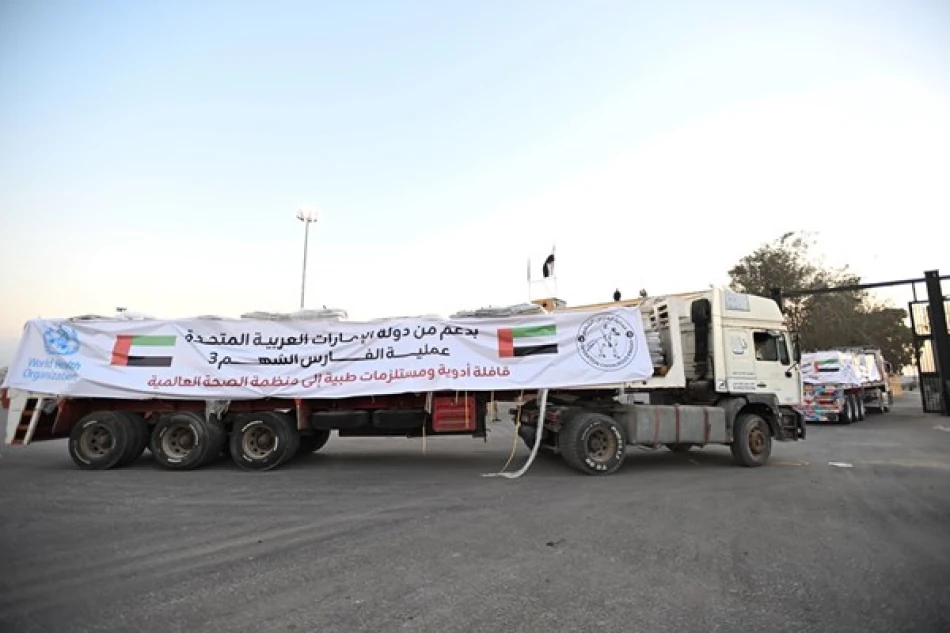
UAE Extends Aid to Gaza's Health Sector Through 'Brave Knight 3' Operation
UAE Delivers Critical Medical Aid to Gaza as Regional Humanitarian Crisis Deepens
The United Arab Emirates has dispatched a substantial humanitarian convoy carrying life-saving medical equipment and food supplies to Gaza through Egypt's Rafah crossing, marking another phase in the Gulf nation's strategic effort to position itself as a regional humanitarian leader amid ongoing Middle Eastern conflicts. The 23-truck convoy represents the UAE's continued commitment to Palestinian relief efforts while navigating complex geopolitical dynamics.
Comprehensive Medical Support Package
The convoy, operating under the UAE's "Operation Gallant Knight 3" humanitarian initiative, delivered sophisticated medical equipment directly to the World Health Organization for distribution across Gaza's hospital network. The shipment included 16 trucks loaded with critical healthcare supplies that Gaza's medical infrastructure desperately needs.
Life-Saving Equipment and Pharmaceuticals
The medical aid package demonstrates a strategic understanding of Gaza's healthcare crisis, featuring ventilators, dialysis machines and filters, respiratory inhalers, IV pumps, and blood glucose monitors. These items address immediate medical emergencies while supporting long-term patient care in a region where medical infrastructure has been severely strained.
Beyond emergency equipment, the UAE included comprehensive medical furniture and support systems: advanced hospital beds, pediatric and neonatal care units, patient transport stretchers, wheelchairs, and medical walking aids. The convoy also carried specialized pharmaceutical refrigeration units designed to preserve temperature-sensitive medications and vaccines—a critical consideration in Gaza's challenging storage conditions.
Strategic Humanitarian Diplomacy
The UAE's sustained humanitarian engagement through "Operation Gallant Knight 3" reflects a broader diplomatic strategy that has characterized Emirati foreign policy since the Abraham Accords. Unlike previous regional approaches that often involved direct political intervention, the UAE has positioned itself as a neutral humanitarian actor capable of delivering aid across traditional conflict lines.
Regional Context and Precedent
This approach mirrors the UAE's humanitarian responses in Yemen, Syria, and Lebanon, where Abu Dhabi has consistently leveraged aid delivery to maintain diplomatic relevance while avoiding direct military involvement. The strategy allows the Emirates to demonstrate regional leadership without antagonizing key international partners, including both Israel and Palestinian authorities.
Implications for Regional Stability
The timing and scale of this aid delivery signal several important developments. First, it demonstrates the UAE's ability to coordinate complex logistics through Egyptian territory, highlighting strong bilateral cooperation between Cairo and Abu Dhabi. Second, the focus on medical rather than general humanitarian aid suggests careful coordination with international organizations to avoid duplication of efforts.
Economic and Political Calculations
For the UAE, humanitarian aid represents both moral imperative and strategic investment. The Emirates has consistently used soft power projection to enhance its regional influence, particularly as traditional powers like Saudi Arabia focus more on domestic transformation. This approach has proven effective in maintaining UAE relevance across multiple regional conflicts while preserving relationships with competing factions.
The inclusion of seven trucks carrying food supplies alongside the medical equipment indicates a comprehensive approach to addressing Gaza's humanitarian crisis. This combination addresses both immediate survival needs and longer-term health infrastructure requirements, suggesting UAE planners understand the complexity of Gaza's challenges extends far beyond any single crisis moment.
Most Viewed News

 Layla Al Mansoori
Layla Al Mansoori






